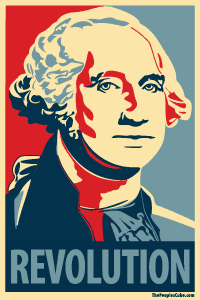By James Simpson | May 8, 2012 | Accuracy in Media

This report reveals the Left’s vote fraud strategy for the 2012 elections. Like a KGB operation, it is thorough, multi-faceted and redundant. It has overt and covert, illegal and legal elements, the latter of which are designed, at least in part, to facilitate illegal activities later. It is a deliberate, premeditated, comprehensive plan to win the 2012 presidential election at all costs, and is in keeping with the organizational methods, associations and ethics of the Community-Organizer-in-Chief, Barack Obama.
The Left seeks fundamental structural change to our entire form of government. In keeping with their amoral, means-justifies-ends philosophy, they will register any voters, dead or alive, legal or illegal, who will then vote as many times as possible, in order to establish a “permanent progressive majority.” As two New York Democrats recently caught in a vote fraud scandal told police, “voter fraud is an accepted way of winning elections…”
Low income individuals are the perfect dupes for this strategy. An expanding welfare state makes them increasingly dependent on government benefits, a development that guarantees their vote for liberal-left candidates. At the same time, people with marginal attachment to society may be less inclined to report illegal activity at the polls—or actually participate. The “victim” narrative promoted in popular culture and press may even encourage such behavior. Meanwhile, a growing tax burden and public debt suck private enterprise dry—pushing ever more people onto the dole.
Politicians of both parties are not above engaging in vote fraud. But this kind of corruption is relegated to individual campaigns or areas where corrupt political establishments have been able to develop unchallenged. It is not a systematic component of overall national strategy, as it is with the Left.
This strategy has been under development for decades. They have constructed an entire industry devoted to this task and pursue a multifaceted strategy to accomplish it:
1. Swamp election officials with overwhelming numbers of registrations at the last possible minute, a huge proportion of which are deliberately fraudulent, in order to create systematic chaos. This accomplishes numerous goals:
- Makes verification of registrations difficult, given the small size and limited budgets of state and local election offices.
- Provides multiple opportunities for vote fraud.
- Throws the entire voting process into question, providing pretext for lawsuits where concessions may be obtained from election officials.
- When election officials challenge registrations, they are accused of “voter suppression.” This in turn serves complementary goals:
- Charge of “voter suppression” reinforces the Left’s narrative about America as an oppressive, “racist” country.
- Publicity and lawsuits intimidate election officials, who settle on terms favorable to the Left.
2. Activists sue state authorities for “voter suppression,” creating further chaos and pressuring them to become de facto taxpayer-funded voter registration operations;
3. Eric Holder’s Justice Department tacitly supports voter intimidation tactics, sues states and backs private lawsuits, and resists reform as “voter suppression.”
4. Leftist echo chamber discredits allegations of vote fraud, supports “suppression” theme, and promotes advantageous legislation.
The ultimate goal is a systematized, taxpayer-funded voting machinery that will guarantee maximum participation from the Left’s voting demographic while undermining the ability to manage elections and prevent fraud.
The ACORN Swamping Method
Key to understanding the Left’s vote-fraud strategy is the community organizing group ACORN. ACORN has become synonymous with corruption, complicity in the subprime mortgage crisis and especially vote fraud.
ACORN and its voter registration arm, Project Vote, hire marginal and unskilled workers at very low rates and use incentive bonuses or quotas to encourage them to collect as many voter registrations as possible. The resulting flood of registrations are fraught with duplicates, errors and omissions, and a large number are overtly fraudulent, including names like “Donald Duck,” “Mickey Mouse,” “Tony Romo” of the Dallas Cowboys, etc.[2] According to MatthewVadum, the senior editor at Capital Research Center, a total of 400,000 bogus ACORN registrations were thrown out in 2008 alone.
ACORN was supposedly disbanded in 2010 but resurrected itself under a slew of new names. Former ACORN President Bertha Lewis bragged that they created “…18 bulletproof community-organizing Frankensteins…” These are reproduced in the table below. Most of these groups occupy former ACORN offices, many with the same staff.
ACORN is directly connected to Obama and the Democratic Party. Counsel to The Advance Group, a strategic planning company, is Michael Gaspard, Patrick Gaspard’s brother. Patrick is currently the DNC’s executive director and President Obama’s former political director. He has worked for ACORN, the Service Employees International Union (SEIU) and the Working Families Party, a descendant of the ACORN-founded New Party which Barack Obama joined in 1996. Obama has bragged of “fighting alongside ACORN on issues you care about my entire career.”
ACORN’s former deputy regional director, Amy Busefink was convicted in 2010 of vote fraud stemming from a 2008 Nevada case. Judicial Watch found that, “while under criminal indictment in Nevada… [Busefink] managed an online program for Project Vote’s 2010 Colorado campaign, the ultimate goal of which is to allow people without a driver’s license or state identification to register to vote online.” Busefink is now national field director for Project Vote.

Barack Obama established his organizing bona fides with Project Vote in 1992, when he registered 150,000 Illinois voters.

Zach Polett (courtesy Anita MonCrief)
Project Vote was created and run for years by Zach Polett, who bragged that he trained Barack Obama in 1992 and said of Obama, “ACORN produces leaders.” Polett is listed in Manta.com as president of Voting for America, one of Project Vote’s former names, although his name is not on Project Vote’s website. Calls to that listing roll into a voice mail identifying the organizations as “CSI.” Polett’s extension is #3. CSI is the acronym for Citizens Services Inc., another supposedly defunct ACORN group that was used to hide over $800,000 paid by candidate Obama to ACORN in 2008.
This kind of duplicitous activity reflects a deliberate methodology. ACORN is a criminal organization.
The Cloward Piven Strategy
ACORN is the face of vote fraud, but its intellectual foundation is the Cloward Piven Strategy. Sociology professors Richard Cloward (Columbia University) and Frances Fox Piven (CUNY) were founding members of Democratic Socialists of America (DSA). Cloward died in 2001 but Piven lives on.

Richard Cloward
In 1966 Cloward and Piven penned an article for The Nation magazine titled “The Weight of the Poor: A Strategy to End Poverty.” They posited that if the poor were organized into street armies to demand all welfare benefits available to them, they could overwhelm and crash the system.
It became known as the “Cloward-Piven Strategy,” and is credited with expanding welfare rolls 151 percent between 1965 and 1974 and bringing New York City to the brink of bankruptcy in 1975.
The Issue is Never the Issue
The Left’s solution to everything is socialism, although they are usually careful not to name it, instead identifying issues that seemingly only their policies can redress. But “the issue is never the issue. The issue is always the revolution” as David Horowitz has explained. The “issues” are mere distractions.
Cloward and Piven initially claimed to be agitating for a “guaranteed national income.” Such a policy is plainly unsustainable; however, it would institutionalize their strategy, creating an enormous, permanent drag on the whole economy precipitating an even larger crash later on. Cloward and Piven’s true goal was to find any instrument to institutionalize their orchestrated anarchy, and poor people were the tool.
Wade Rathke, a veteran of those early efforts, was mentored by Cloward and Piven. Rathke and other radicals created a new organization, ACORN,and sought ways to further extend the Strategy.

White House ACORN photo: Bill Clinton center; Wade Rathke third to his left; Zach Polett in lower left-hand corner. Courtesy Anita MonCrief
With passage of the 1977 Community Reinvestment Act, ACORN and other activist groups got in the housing business. They began pushing banks to offer high-risk mortgage loans to low/no income borrowers. The Clinton administration aggressively ramped up the effort. To encourage lenders and investors, Fannie Mae and Freddie Mac underwrote the risk. Since its passage, CRA lending has exceeded $6 trillion.[ii] The mortgage crisis was Cloward-Piven on steroids.[2]
Meanwhile, Cloward and Piven had not been idle. In 1982 they created the Human Service Employees Registration and Voter Education Fund (Human SERVE) to build political momentum for a law that would turn state motor vehicle and welfare agencies into low-income voter registration offices.
National Voter Registration Act

Motor Voter Signing Ceremony – Cloward in light grey suit, Piven in green. Source: the White House
Throughout the 1980s, Human SERVE field-tested legal and political strategies to promote this plan. The fruits of its labor were finally realized with “Motor Voter,” the National Voter Registration Act of 1993 (NVRA), signed into law with Cloward and Piven standing directly behind President Clinton.
The NVRA requires motor vehicle, military recruiting, public assistance and other state and local offices to offer voter-registration services.
The NVRA has become a beacon for vote fraud. Its minimal verification requirements opened the door to ACORN-style massive voter registration fraud, and in the confusion provide blanket opportunities for vote fraud.
Voter ID laws have become critically important. According to a Pew report, approximately 24 million or 12.5 percent of voter registrations nationally are either invalid or inaccurate, including about 1.8 million deceased individuals, and 2.75 million with multiple-state registrations.
And while the NRVA has provisions for purging the rolls in Section 8, they require a complex, process spanning multiple election cycles. In some cases, the NRVA replaced better mechanisms already in use. Many states have simply not followed these procedures with any regularity. The Left ignores all this, focusing on enforcing NRVA’s Section 7.
Section 7 Lawsuits
While capitalizing on the vote fraud swamping strategy enabled by the NVRA, ACORN, Project Vote and others sue states that don’t aggressively execute the voter registration activities required by Section 7 of the law. The narrative is always “voter suppression,” and settlements have forced state agencies to become de facto low income voter registration drives.
Not only must states develop, maintain and execute plans for assuring comprehensive registration, they are forced to report regularly to ACORN lawyers. A 2009 settlement between ACORN and Missouri’s Department of Social Services is illustrative. DSS must:
- Create an NVRA State Coordinator position
- Designate an NVRA Site Coordinator for Family Support Division offices
- Keep detailed records of client visits and registration activities
- Immediately send a letter offering registration to any individual who “may not have been given the opportunity to register…”
- Report detailed compliance data to plaintiff lawyers every month.
- State coordinator’s performance measured by NVRA compliance
- ACORN will receive $450,000 in settlement.
In these settlements, ACORN effectively assumes an executive role over state agencies. Notably, there is no corollary requirement to ascertain the legality of registrations or to clean up the rolls.
Project Vote has taken recent actions against Louisiana, Ohio, Indiana, Georgia, and New Mexico. They just announced their intention to sue Pennsylvania.
Project Vote formed agreements with Colorado in 2008 and 2010. According to Judicial Watch, after Project Vote’s involvement “the percentage of invalid voter registration forms from Colorado public assistance agencies was four times the national average.”
Though largely unnoticed until now, this litigation tactic has been used since the 1980s, when Human SERVE’s legal allies sued state authorities for settlements creating localized versions of Motor Voter.
While capitalizing on the vote swamping strategy enabled by Motor Voter, ACORN and Project Vote picked up the torch for SERVE, which closed its doors in 2000. Frances Fox Piven serves today on Project Vote’s Board of Directors. Significantly, President Obama has named the voter registration initiative of his reelection effort “Project Vote.”
Piven also has many other connections to Obama. She was a founding member of Progressives for Obama. Her Democratic Socialists of America bragged that it was responsible for the success of Obama’s “ground game” in 2008. Piven was one of 130 founding members of the radical left Campaign for America’s Future. Many CAF members also sit on the board of the Apollo Alliance, the executor of Obama’s “Green” jobs initiative.
DOJ and ACORN Team Up for 2012
Judicial Watch obtained several documents showing coordination between DOJ, Project Vote and the White House.[i] In one email, Project Vote demanded action on NVRA cases. Less than a month later, DOJ sued Rhode Island for NVRA noncompliance. Similarly, DOJ’s Louisiana NVRA suit followed Project Vote’s by a few months. Project Vote is promoting prospective employees for DOJ’s Voting Rights section.
The VRA outlawed poll taxes and literacy tests for voting. Section 5 requires certain states and other political subdivisions to obtain “preclearance,” or permission, from either DOJ or the U.S. District Court in Washington, DC, on any change affecting voting. Currently, preclearance states covered in whole or in part include: Alabama, Alaska, Arizona, California, Florida, Georgia, Louisiana, Michigan, Mississippi, New Hampshire, New York, North Carolina, South Carolina, South Dakota, Texas and Virginia. Set in 1982 to expire in 2007, Congress extended the VRA for another 25 years in 2006.
The VRA has come into sharp focus this year as the Holder administration has used VRA preclearance requirements to stall or prevent voter ID laws from being enacted. Non-preclearance states have faced stiff court challenges from other leftist groups.
Alabama – Alabama’s new photo ID law has a 2014 effective date. Alabama has not yet applied for pre-clearance.
Arizona – 9th Circuit upheld ID requirement of new law; struck requirement that voter prove citizenship.
Mississippi – A Voter ID amendment was approved by voters with a 62 percent margin in 2011. A bill to implement the amendment passed April 10, 2012. Requires preclearance. No word yet from Justice.
South Carolina – DOJ denied pre-clearance for new ID law in December 2011. State filed for reconsideration.
Texas – DOJ denied pre-clearance for new ID law. Texas filed suit with three-judge panel seeking pre-clearance; DOJ asked court to postpone trial.
Wisconsin – State judge ruled Wisconsin’s voter ID law unconstitutional (read the opinion). State will appeal.
The Wisconsin case is an example of independent groups working to sabotage reform efforts. In a suit brought by the League of Women Voters, the NAACP and others, the judge found ID laws “unconstitutional to the extent they serve as a condition for voting at the polls.” This was a bizarre ruling. Wisconsin’s Constitution clearly allows mechanisms to establish voter eligibility.
Despite the Left’s best efforts, voter ID laws have been proposed this year in 32 states.
A Personal Testimony
J. Christian Adams is a former DOJ election lawyer who worked on the Philadelphia Black Panther voter intimidation case. He resigned in protest of Eric Holder’s race-based application of the law. According to Adams’ new book, Injustice, Eric Holder became directly involved in the Black Panther case. Mr. Adams agreed to be interviewed for this report. Some highlights:
Read the full article here.
Related Articles
- Stealing Our Elections (spectator.org)
- Court Watching: 2008 Democrat Vote Fraud in Indiana and Virginia (wizbangblog.com)
- Massive Vote Fraud Exposé Set to Rock Washington (usapartisan.com)
- Black, Latino Voter Registration Drops (newamericamedia.org)
- Amid Push For Voter Suppression Laws, Minority Voter Registration Declines (thinkprogress.org)
- In 2008, John McCain Ignored Vote Fraud to Avoid Civil Unrest (canadafreepress.com)
- Devvy Kidd – Mechanism in place to fix 2012 election for Obama/Soetoro (gunnyg.wordpress.com)
- Progressive Vote Fraud and Intimidation EXPOSED (gulagbound.com)
- This week in the War on Voting: Voter Fraud Fraud and the lesson of Indiana (dailykos.com)
- Joseph Stalin Election Fraud Page! (politicalvelcraft.org)
- A Vote Fraud Conviction in Indiana (volokh.com)
- Obenshain on Voter Id (citizentom.com)
- Reuters: Obama needs vote fraud (blogs.dailymail.com)
- ACORN Whistleblower Says Obama DOJ ‘Has Gone Wild’ (spectator.org)
- Republican Party Overmatched By Soros Backed ‘Vote Fraud Denier Industry’ (spectator.org)
- Breaking: Nevada To Press On With Criminal Prosecution of ACORN (biggovernment.com)
- How Incompetence and Malfeasance Infect the Voting Process (americanthinker.com)
- John Fund, J. Christian Adams on Voter Fraud (spectator.org)
- More Republican Voter Fraud (mikethemadbiologist.com)
- If Voting Isn’t Fair, We’re Not Free: An Interview With Catherine Engelbrecht (johnmalcolm.me)
- Judicial Watch Announces: The 2012 Election Integrity Project (biggovernment.com)
- Study: 24 Million Invalid Voter Registrations, 1.8 Million Dead Voters Still Registered on Rolls (wizbangblog.com)
- Texas Democrats seek to expedite appeal against local tea party group (rawstory.com)



 Aside from detailing how PSYOP teams will use “indoctrination programs to reduce or remove antagonistic attitudes,” as well as targeting “political activists” with indoctrination programs to provide “understanding and appreciation of U.S. policies and actions,” the manual directs political prisoners to be separated from the rest of the camp population.
Aside from detailing how PSYOP teams will use “indoctrination programs to reduce or remove antagonistic attitudes,” as well as targeting “political activists” with indoctrination programs to provide “understanding and appreciation of U.S. policies and actions,” the manual directs political prisoners to be separated from the rest of the camp population. 69 members of the U.S. House of Representatives have sent Barack Obama a letter expressing their concern that a new international treaty currently being negotiated would essentially ban all “Buy American” laws.
69 members of the U.S. House of Representatives have sent Barack Obama a letter expressing their concern that a new international treaty currently being negotiated would essentially ban all “Buy American” laws.






